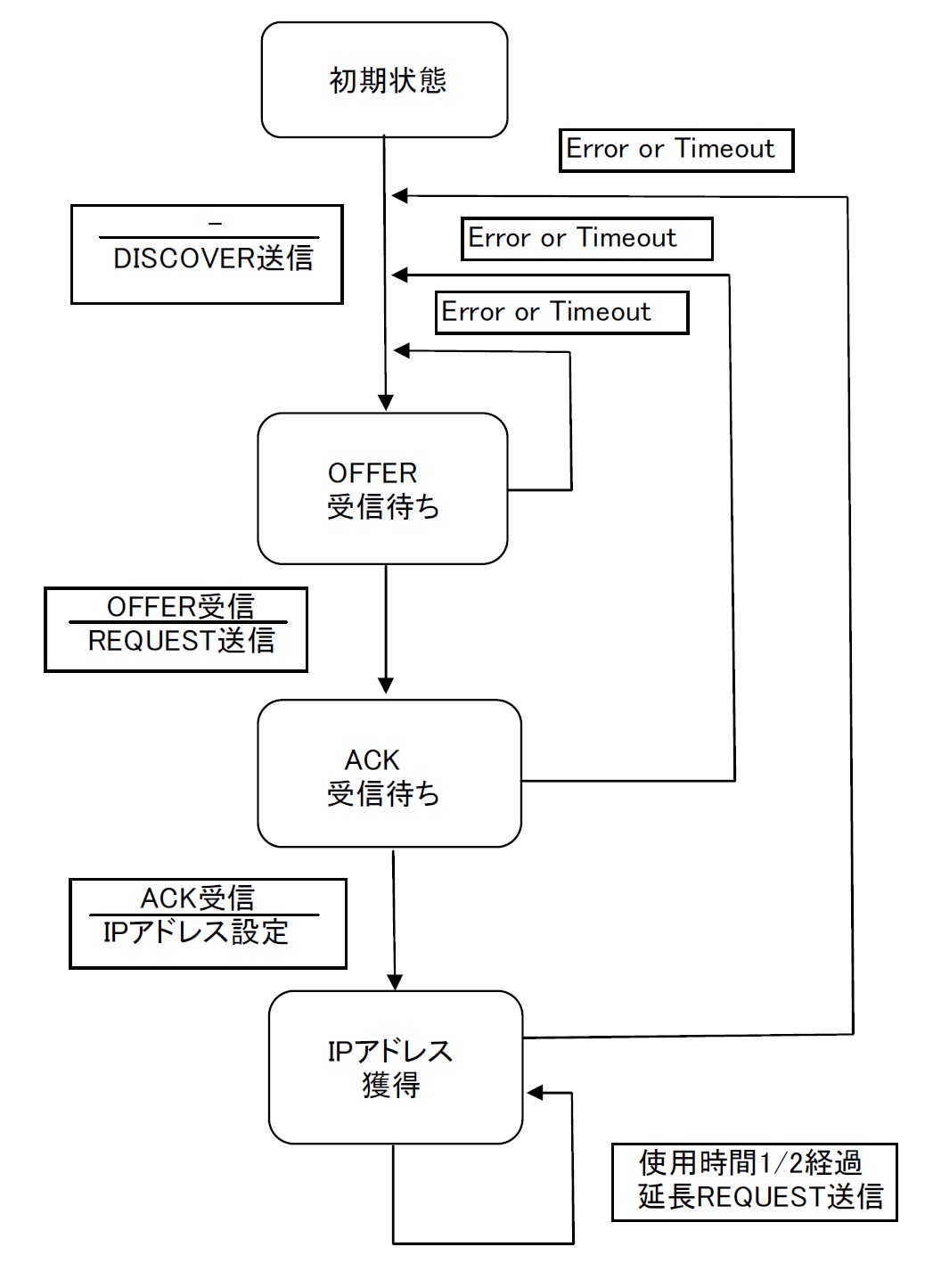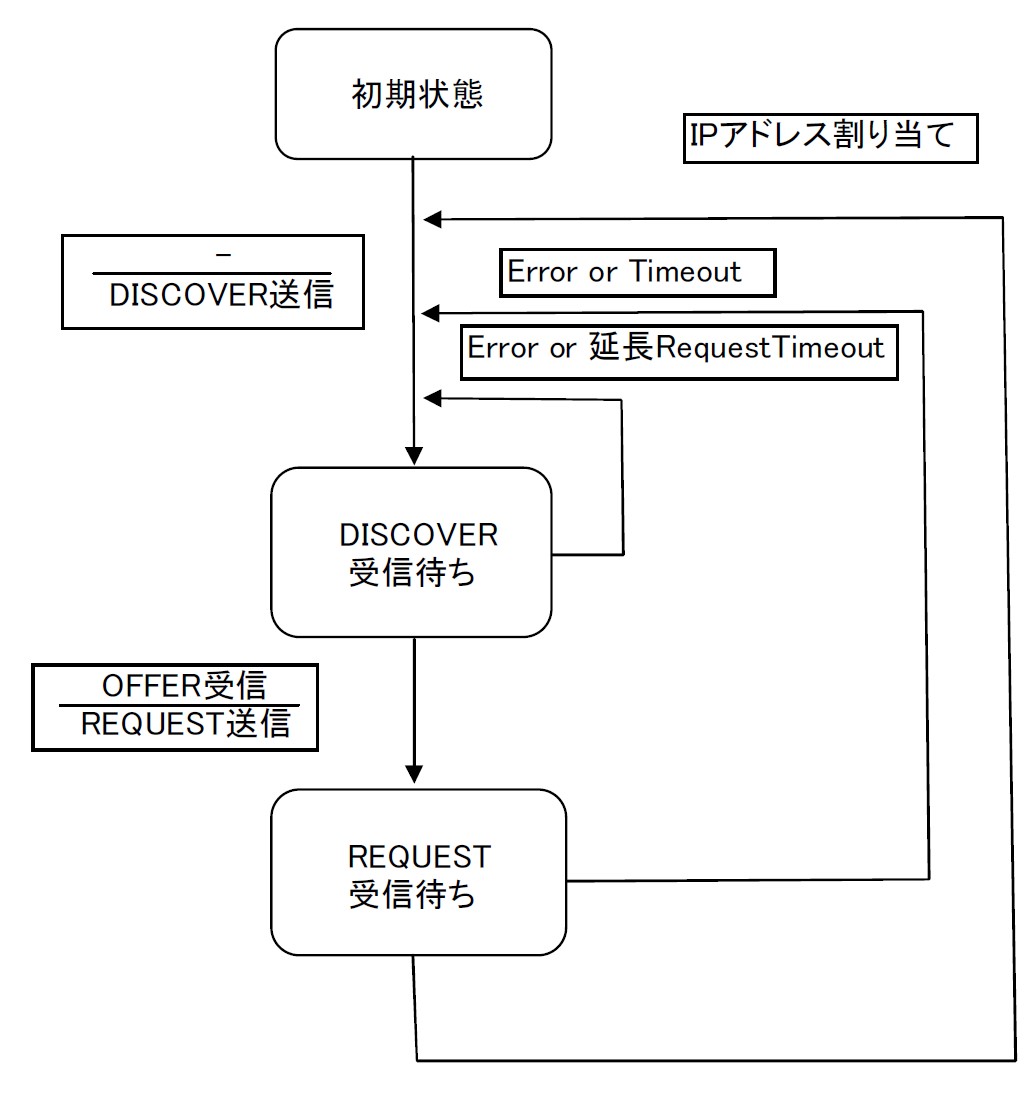
C言語で疑似DHCPクライアント・サーバを教えて!
こういった悩みにお答えします.
本記事の信頼性
- リアルタイムシステムの研究歴12年.
- 東大教員の時に,英語でOS(Linuxカーネル)の授業.
- 2012年9月~2013年8月にアメリカのノースカロライナ大学チャペルヒル校(UNC)コンピュータサイエンス学部で客員研究員として勤務.C言語でリアルタイムLinuxの研究開発.
- プログラミング歴15年以上,習得している言語: C/C++,Python,Solidity/Vyper,Java,Ruby,Go,Rust,D,HTML/CSS/JS/PHP,MATLAB,Verse(UEFN), Assembler (x64,aarch64).
- 東大教員の時に,C++言語で開発した「LLVMコンパイラの拡張」,C言語で開発した独自のリアルタイムOS「Mcube Kernel」をGitHubにオープンソースとして公開.
- 2020年1月~現在はアメリカのノースカロライナ州チャペルヒルにあるGuarantee Happiness LLCのCTOとしてECサイト開発やWeb/SNSマーケティングの業務.2022年6月~現在はアメリカのノースカロライナ州チャペルヒルにあるJapanese Tar Heel, Inc.のCEO兼CTO.
- 最近は自然言語処理AIとイーサリアムに関する有益な情報発信や,Unreal Editor for Fortnite(UEFN)でゲーム開発に従事.
- (AI全般を含む)自然言語処理AIの論文の日本語訳や,AIチャットボット(ChatGPT,Auto-GPT,Gemini(旧Bard)など)の記事を50本以上執筆.アメリカのサンフランシスコ(広義のシリコンバレー)の会社でChatGPT/Geminiを訓練するプロンプトエンジニア・マネージャー・Quality Assurance(QA)の業務委託の経験あり.
- (スマートコントラクトのプログラミングを含む)イーサリアムや仮想通貨全般の記事を200本以上執筆.イギリスのロンドンの会社で仮想通貨の英語の記事を日本語に翻訳する業務委託の経験あり.
- UEFNで10本以上のゲームを開発し,フォートナイト上で公開(Fortnite,Fortnite.GG).
こういった私から学べます.
C言語を独学で習得することは難しいです.
私にC言語の無料相談をしたいあなたは,公式LINE「ChishiroのC言語」の友だち追加をお願い致します.
私のキャパシティもあり,一定数に達したら終了しますので,今すぐ追加しましょう!
独学が難しいあなたは,元東大教員がおすすめするC言語を学べるオンラインプログラミングスクール5社で自分に合うスクールを見つけましょう.後悔はさせません!
目次
疑似DHCPクライアント・サーバ
C言語で疑似DHCPクライアント・サーバを紹介します.
本記事は以下の内容を理解していることを前提とします.
擬似DHCPでIPアドレスを割り当て,解法等の管理をするプログラムです.
15秒ごとにIPアドレスの更新手続きを行います.
更新に失敗した場合,新しいIPアドレスの要求を行います.
上記の手順を状態遷移で実装します.
疑似DHCPクライアントの状態遷移は以下になります.

疑似DHCPサーバの状態遷移は以下になります.

疑似DHCPクライアント・サーバのコード
疑似DHCPクライアント・サーバのコード一式はこちらからダウンロードして下さい.
コード一式は以下になります.
- Makefile:makeのビルドファイル
- common.h,common.c:疑似DHCPクライアント・サーバの共通ファイル
- config.txt:疑似DHCPサーバのIPアドレスとネットマスクの設定ファイル
- mydhcp_client.c:疑似DHCPクライアントのファイル
- mydhcp_server.c:疑似DHCPサーバのファイル
以下の手順で解凍とmakeでビルドします.
|
1 2 3 4 5 6 7 8 |
$ unzip mydhcp.zip $ cd mydhcp $ make gcc -Wall -c -o mydhcp_client.o mydhcp_client.c gcc -Wall -c -o common.o common.c gcc -o mydhcp_client mydhcp_client.c common.c -Wall gcc -Wall -c -o mydhcp_server.o mydhcp_server.c gcc -o mydhcp_server mydhcp_server.c common.c -Wall |
common.h,common.c,mydhcp_client.c,mydhcp_server.cは以下になります.
|
1 2 3 4 5 6 7 8 9 10 11 12 13 14 15 16 17 18 19 20 21 22 23 24 25 26 27 28 29 30 31 32 33 34 35 36 37 38 39 40 41 42 43 44 45 46 47 48 49 |
/* * Author: Hiroyuki Chishiro * License: 2-Clause BSD */ #ifndef __COMMON_H__ #define __COMMON_H__ #define PORT 65432 #define BUFSIZE 128 #define NETSIZE 32 enum states { STAT_WAIT_DISCOVER = 1, STAT_WAIT_OFFER = 2, STAT_WAIT_REQUEST = 3, REPLY = 4, RELEASE = 5, STAT_WAIT_ACK = 6, DHCPDISCOVER = 7, DHCPOFFER = 8, DHCPREQUEST = 9, DHCPACK = 10, STAT_BOUND = 11 }; enum time { USETIME_SEC = 30, USETIME_USEC = 0 }; typedef struct message { uint8_t type; uint8_t code; uint16_t time_to_live; uint8_t ip[NETSIZE]; uint8_t netmask[NETSIZE]; } message; typedef struct command_table { char *cmd; void (*func)(void); } table; void command(int n, char pBuf[], table *cmd_tbl); #define EXIT_STR "exit" #endif /* __COMMON_H__ */ |
|
1 2 3 4 5 6 7 8 9 10 11 12 13 14 15 16 17 18 19 20 21 22 23 24 25 26 27 28 29 30 31 32 33 34 35 36 37 38 39 40 41 |
/* * Author: Hiroyuki Chishiro * License: 2-Clause BSD */ #include <stdio.h> #include <string.h> #include <inttypes.h> #include "common.h" int search_keytab(int n, char s[], table *cmd_tbl) { int cond; int low, mid, high; low = 0; high = n - 1; while (low <= high) { mid = (low + high) / 2; if ((cond = strcmp(s, cmd_tbl[mid].cmd)) < 0) { high = mid - 1; } else if (cond > 0) { low = mid + 1; } else { return mid; } } return -1; } void command(int n, char pBuf[], table *cmd_tbl) { int key; if ((key = search_keytab(n, pBuf, cmd_tbl)) < 0 || key > n - 1) { fprintf(stderr, "Error: %s is unknown command\n", pBuf); } else { (cmd_tbl[key].func)(); } } |
|
1 2 3 4 5 6 7 8 9 10 11 12 13 14 15 16 17 18 19 20 21 22 23 24 25 26 27 28 29 30 31 32 33 34 35 36 37 38 39 40 41 42 43 44 45 46 47 48 49 50 51 52 53 54 55 56 57 58 59 60 61 62 63 64 65 66 67 68 69 70 71 72 73 74 75 76 77 78 79 80 81 82 83 84 85 86 87 88 89 90 91 92 93 94 95 96 97 98 99 100 101 102 103 104 105 106 107 108 109 110 111 112 113 114 115 116 117 118 119 120 121 122 123 124 125 126 127 128 129 130 131 132 133 134 135 136 137 138 139 140 141 142 143 144 145 146 147 148 149 150 151 152 153 154 155 156 157 158 159 160 161 162 163 164 165 166 167 168 169 170 171 172 173 174 175 176 177 178 179 180 181 182 183 184 185 186 187 188 189 190 191 192 193 194 195 196 197 198 199 200 201 202 203 204 205 206 207 208 209 210 211 212 213 214 215 216 217 218 219 220 221 222 223 224 225 226 227 228 229 230 231 232 233 234 235 236 237 238 239 240 241 242 243 244 245 246 247 248 249 250 251 252 253 254 255 256 257 258 259 260 261 262 263 264 265 266 267 268 269 270 271 272 273 274 275 276 277 278 279 280 281 282 283 284 285 286 287 288 289 290 291 292 293 294 295 296 297 298 299 300 301 302 303 304 305 306 307 308 309 310 311 312 313 314 315 316 317 318 319 320 321 322 323 324 325 326 327 328 329 330 331 332 333 334 335 336 337 338 339 340 341 342 343 344 345 346 347 348 349 350 351 352 353 354 355 356 357 358 359 360 361 362 363 364 365 366 367 368 369 370 371 372 373 374 375 376 377 378 379 380 |
/* * Author: Hiroyuki Chishiro * License: 2-Clause BSD */ #include <stdio.h> #include <stdlib.h> #include <string.h> #include <stdbool.h> #include <sys/time.h> #include <sys/socket.h> #include <sys/select.h> #include <netinet/in.h> #include <arpa/inet.h> #include <unistd.h> #include <netdb.h> #include <time.h> #include <signal.h> #include <limits.h> #include "common.h" void func_exit(void); void func_release(void); void func_timeout(void); table cmd_tbl[] = { {.cmd = "exit", .func = func_exit}, {.cmd = "re", .func = func_release}, {.cmd = "to", .func = func_timeout} }; #define NKEYS (sizeof cmd_tbl / sizeof cmd_tbl[0]) #define DEBUG(s) puts(s) message msg; int msg_num = sizeof(message); int sock; int alrmflag = 0; int status; struct sockaddr_in serverAddr; struct itimerval *itv; struct timeval tv, to; struct itimerval value, ivalue, ovalue; void sigint_handler(int signal) { printf("\nrelease client\n"); msg.type = RELEASE; msg.netmask[0] = '\0'; if (sendto(sock, &msg, sizeof(message), 0, (struct sockaddr *) &serverAddr, sizeof(serverAddr)) != msg_num) { perror("sendto"); exit(9); } exit(0); } void sigalrm_handler(int signal) { alrmflag++; } void func_exit(void) { /* do nothing but go to exit. */ } void func_timeout(void) { if (status == STAT_BOUND) { gettimeofday(&tv, NULL); printf("CurrentTime: %s", ctime((time_t *) &tv)); printf("TimeoutTime: %s", ctime((time_t *) &to)); } else { fprintf(stderr, "Error: haven't allocated IP address yet.\n"); } } void func_release(void) { printf("\nrelease IP address %s\n", msg.ip); msg.type = RELEASE; msg.netmask[0] = '\0'; if (sendto(sock, &msg, sizeof(message), 0, (struct sockaddr *) &serverAddr, sizeof(serverAddr)) != msg_num) { perror("sendto"); exit(10); } setitimer(ITIMER_REAL, &ovalue, NULL); sleep(1); msg.type = DHCPDISCOVER; msg.code = 0; if (sendto(sock, &msg, sizeof(message), 0, (struct sockaddr *) &serverAddr, sizeof(serverAddr)) != msg_num) { perror("sendto"); exit(7); } status = STAT_WAIT_OFFER; printf("\tstatus: STAT_WAIT_OFFER\n"); } int main(int argc, char *argv[]) { int msgtype; struct sockaddr_in clientAddr; int addrLen; int n; struct hostent *pServerHostEnt; char pBuf[BUFSIZE]; fd_set fds, readfds; if (argc != 2) { fprintf(stderr, "Error: %s [hostname]\n", argv[0]); exit(1); } if ((pServerHostEnt = (struct hostent *) gethostbyname(argv[1])) == NULL) { perror("gethostbyname"); exit(2); } memset((char *) &serverAddr, 0, sizeof(serverAddr)); serverAddr.sin_family = AF_INET; memmove((char *) &serverAddr.sin_addr, (void *) pServerHostEnt->h_addr, pServerHostEnt->h_length); serverAddr.sin_port = htons(PORT); if ((sock = socket(AF_INET, SOCK_DGRAM, 0)) < 0) { perror("socket"); exit(3); } memset((char *) &clientAddr, 0, sizeof(clientAddr)); clientAddr.sin_family = AF_INET; clientAddr.sin_addr.s_addr = htonl(INADDR_ANY); clientAddr.sin_port = htons(0); if (bind(sock, (struct sockaddr *) &clientAddr, sizeof(clientAddr)) < 0) { perror("bind"); exit(4); } signal(SIGINT, sigint_handler); signal(SIGALRM, sigalrm_handler); msg.type = DHCPDISCOVER; msg.code = 0; msg.time_to_live = 0; if (sendto(sock, &msg, sizeof(message), 0, (struct sockaddr *) &serverAddr, sizeof(serverAddr)) != msg_num) { perror("sendto"); exit(5); } FD_ZERO(&readfds); FD_SET(0, &readfds); FD_SET(sock, &readfds); status = STAT_WAIT_OFFER; printf("\tstatus: STAT_WAIT_OFFER\n"); value.it_value.tv_usec = USETIME_USEC; value.it_value.tv_sec = USETIME_SEC / 2; value.it_interval.tv_usec = USETIME_USEC; value.it_interval.tv_sec = USETIME_SEC / 2; ivalue.it_value.tv_usec = USETIME_USEC; ivalue.it_value.tv_sec = USETIME_SEC; ivalue.it_interval.tv_usec = USETIME_USEC; ivalue.it_interval.tv_sec = USETIME_SEC; setitimer(ITIMER_REAL, &ivalue, &ovalue); while (true) { memcpy(&fds, &readfds, sizeof(fd_set)); if (select(sock + 1, &fds, NULL, NULL, NULL) < 0) { if (alrmflag > 0) { if (alrmflag == 1 && status == STAT_BOUND) { printf("Request continue IP address %s\n", msg.ip); setitimer(ITIMER_REAL, &value, NULL); msg.type = DHCPREQUEST; msg.code = 11; printf("send msgtype: DHCPREQUEST\n"); if (sendto(sock, &msg, sizeof(message), 0, (struct sockaddr *) &serverAddr, sizeof(serverAddr)) != msg_num) { perror("sendto"); exit(6); } continue; } else { alrmflag = 0; printf("Timeout\n"); msg.type = DHCPDISCOVER; msg.code = 0; msg.ip[0] = '\0'; msg.netmask[0] = '\0'; msg.time_to_live = 0; printf("send msgtype: DHCPDISCOVER\n"); if (sendto(sock, &msg, sizeof(message), 0, (struct sockaddr *) &serverAddr, sizeof(serverAddr)) != msg_num) { perror("sendto"); exit(7); } setitimer(ITIMER_REAL, &ovalue, NULL); setitimer(ITIMER_REAL, &ivalue, NULL); status = STAT_WAIT_OFFER; printf("\tstatus: STAT_WAIT_OFFER\n"); continue; } } else { perror("select"); exit(8); } } if (FD_ISSET(0, &fds)) { if ((n = read(0, pBuf, BUFSIZE)) > 0) { pBuf[n - 1] = '\0'; printf("Execute command: %s\n", pBuf); command(NKEYS, pBuf, cmd_tbl); if (!strncmp(pBuf, EXIT_STR, strlen(EXIT_STR))) { break; } } continue; } if (FD_ISSET(sock, &fds)) { if ((n = recvfrom(sock, &msg, sizeof(message), 0, (struct sockaddr *) &clientAddr, (socklen_t *) &addrLen)) < 0) { perror("recvfrom"); break; } } if (alrmflag == 1) { if (msg.code == 12) { alrmflag = 0; gettimeofday(&tv, NULL); printf("Success contniue IP address %s\n", msg.ip); printf("CurrentTime: %s", ctime((time_t *) &tv)); to.tv_sec = tv.tv_sec + msg.time_to_live; to.tv_usec = tv.tv_usec; printf("TimeoutTime: %s", ctime((time_t *) &to)); setitimer(ITIMER_REAL, &ovalue, NULL); setitimer(ITIMER_REAL, &value, NULL); continue; } else { alrmflag = 0; fprintf(stderr, "Error: failure continue IP address %s\n", msg.ip); msg.type = DHCPDISCOVER; msg.code = 0; msg.ip[0] = '\0'; msg.netmask[0] = '\0'; msg.time_to_live = 0; printf("send msgtype: DHCPDISCOVER\n"); if (sendto(sock, &msg, sizeof(message), 0, (struct sockaddr *) &serverAddr, sizeof(serverAddr)) != msg_num) { perror("sendto"); exit(9); } setitimer(ITIMER_REAL, &ovalue, NULL); setitimer(ITIMER_REAL, &ivalue, NULL); status = STAT_WAIT_OFFER; printf("\tstatus: STAT_WAIT_OFFER\n"); continue; } } printf("Server IP: %s\n", inet_ntoa(serverAddr.sin_addr)); msgtype = msg.type; switch (status) { case STAT_WAIT_OFFER: if (msgtype == DHCPOFFER) { printf("receive msgtype: DHCPOFFER\n"); if (msg.code == 0) { msg.type = DHCPREQUEST; msg.code = 10; printf("send msgtype: DHCPREQUEST\n"); if (sendto(sock, &msg, sizeof(message), 0, (struct sockaddr *) &serverAddr, sizeof(serverAddr)) != msg_num) { perror("sendto"); exit(10); } printf("\tstatus: STAT_WAIT_ACK\n"); status = STAT_WAIT_ACK; } else if (msg.code == 129) { fprintf(stderr, "Error: failed IP address\n"); } else { fprintf(stderr, "Error: unexpected message received: code = %d\n", msg.code); } } else { fprintf(stderr, "Error: receive %d, not %d\n", msgtype, DHCPOFFER); } break; case STAT_WAIT_ACK: if (msgtype == DHCPACK) { printf("receive msgtype: DHCPACK\n"); if (msg.code == 0) { printf("IP: %s netmask: %s\n", msg.ip, msg.netmask); gettimeofday(&tv, NULL); printf("CurrentTime: %s", ctime((time_t *) &tv)); to.tv_sec = tv.tv_sec + msg.time_to_live; to.tv_usec = tv.tv_usec + USETIME_USEC; printf("TimeoutTime: %s", ctime((time_t *) &to)); setitimer(ITIMER_REAL, &ovalue, NULL); setitimer(ITIMER_REAL, &value, NULL); status = STAT_BOUND; printf("\tstatus: STAT_BOUND\n"); } else if (msg.code == 130) { fprintf(stderr, "Error: failed IP address\n"); } else { fprintf(stderr, "Error: unexpected message received\n"); } } else { fprintf(stderr, "Error: receive %d not %d\n", msgtype, DHCPACK); } break; case STAT_BOUND: printf("\tstatus: STAT_BOUND\n"); break; default: fprintf(stderr, "Error: undefined status\n"); msg.type = DHCPDISCOVER; msg.code = 0; printf("send msgtype: DHCPDISCOVER\n"); if (sendto(sock, &msg, sizeof(message), 0, (struct sockaddr *) &serverAddr, sizeof(serverAddr)) != msg_num) { perror("sendto"); exit(11); } setitimer(ITIMER_REAL, &ovalue, NULL); status = STAT_WAIT_OFFER; printf("\tSTAT_WAIT_OFFER\n"); break; } } FD_CLR(0, &readfds); if (close(sock) == -1) { perror("close"); exit(12); } return 0; } |
|
1 2 3 4 5 6 7 8 9 10 11 12 13 14 15 16 17 18 19 20 21 22 23 24 25 26 27 28 29 30 31 32 33 34 35 36 37 38 39 40 41 42 43 44 45 46 47 48 49 50 51 52 53 54 55 56 57 58 59 60 61 62 63 64 65 66 67 68 69 70 71 72 73 74 75 76 77 78 79 80 81 82 83 84 85 86 87 88 89 90 91 92 93 94 95 96 97 98 99 100 101 102 103 104 105 106 107 108 109 110 111 112 113 114 115 116 117 118 119 120 121 122 123 124 125 126 127 128 129 130 131 132 133 134 135 136 137 138 139 140 141 142 143 144 145 146 147 148 149 150 151 152 153 154 155 156 157 158 159 160 161 162 163 164 165 166 167 168 169 170 171 172 173 174 175 176 177 178 179 180 181 182 183 184 185 186 187 188 189 190 191 192 193 194 195 196 197 198 199 200 201 202 203 204 205 206 207 208 209 210 211 212 213 214 215 216 217 218 219 220 221 222 223 224 225 226 227 228 229 230 231 232 233 234 235 236 237 238 239 240 241 242 243 244 245 246 247 248 249 250 251 252 253 254 255 256 257 258 259 260 261 262 263 264 265 266 267 268 269 270 271 272 273 274 275 276 277 278 279 280 281 282 283 284 285 286 287 288 289 290 291 292 293 294 295 296 297 298 299 300 301 302 303 304 305 306 307 308 309 310 311 312 313 314 315 316 317 318 319 320 321 322 323 324 325 326 327 328 329 330 331 332 333 334 335 336 337 338 339 340 341 342 343 344 345 346 347 348 349 350 351 352 353 354 355 356 357 358 359 360 361 362 363 364 365 366 367 368 369 370 371 372 373 374 375 376 377 378 379 380 381 382 383 384 385 386 387 388 389 390 391 392 393 394 395 396 397 398 399 400 401 402 403 404 405 406 407 408 409 410 411 412 413 414 415 416 417 418 419 420 421 422 423 424 425 426 427 428 429 430 431 432 433 434 435 436 437 438 439 440 441 442 443 444 445 446 447 448 449 450 451 452 453 454 455 456 457 458 459 460 461 462 463 464 465 466 467 468 469 470 |
/* * Author: Hiroyuki Chishiro * License: 2-Clause BSD */ #include <stdio.h> #include <stdlib.h> #include <string.h> #include <stdbool.h> #include <sys/types.h> #include <sys/time.h> #include <sys/socket.h> #include <sys/select.h> #include <netinet/in.h> #include <arpa/inet.h> #include <unistd.h> #include <ctype.h> #include <time.h> #include <signal.h> #include <limits.h> #include "common.h" typedef struct address { struct address *bp; struct address *fp; int port; uint8_t ip[NETSIZE]; uint8_t netmask[NETSIZE]; } address; void func_exit(void); void func_ip(void); void func_timeout(void); void func_use(void); table cmd_tbl[] = { {.cmd = "exit", .func = func_exit}, {.cmd = "ip", .func = func_ip}, {.cmd = "to", .func = func_timeout}, {.cmd = "use", .func = func_use} }; #define NKEYS (sizeof(cmd_tbl) / sizeof(cmd_tbl[0])) #define DEBUG(s) puts(s) address head; address use; struct timeval tv, to; struct itimerval value, ovalue; int alrmflag = 0; void insert_bottom(address *h, address *p) { p->fp = h; p->bp = h->bp; h->bp->fp = p; h->bp = p; } void init_config(char *argv) { FILE *fp; char line[BUFSIZE]; int i, j; char tmp[NETSIZE]; char tmp2[NETSIZE]; address *p; address *ptr; head.fp = head.bp = &head; use.fp = NULL; if ((fp = fopen(argv, "r")) == NULL) { fprintf(stderr, "Error: cannot open %s\n", argv); exit(2); } while (fgets(line, sizeof line, fp) != NULL) { i = 0; while (isspace(line[i]) && line[i] != '\n') { i++; } if (line[i] == '\n') { continue; } j = 0; while (!isspace(line[i]) && line[i] != '\n') { tmp[j++] = line[i++]; } tmp[j] = '\0'; while (isspace(line[i]) && line[i] != '\n') { i++; } if (line[i] == '\n') { continue; } j = 0; while (!isspace(line[i]) && line[i] != '\n') { tmp2[j++] = line[i++]; } tmp2[j] = '\0'; if ((ptr = (address *) malloc(sizeof(address))) == NULL) { fprintf(stderr, "Error: cannot allocate memory %zu\n", sizeof(address)); exit(3); } ptr->port = -1; strcpy((char *) ptr->ip, (char *) tmp); strcpy((char *) ptr->netmask, (char *) tmp2); insert_bottom(&head, ptr); } for (p = head.fp; p != &head; p = p->fp) { printf("ip = %s net = %s\n", p->ip, p->netmask); } if (fclose(fp) == EOF) { fprintf(stderr, "Error: cannot close file %s\n", argv); exit(4); } } void exit_config(void) { address *p = head.fp, *prev; while (p != &head) { printf("ip = %s net = %s\n", p->ip, p->netmask); prev = p; p = p->fp; free(prev); } } void insert_use(address *p) { address *ap; if (use.fp == NULL) { use.fp = p; } else { for (ap = use.fp; ap->fp != NULL; ap = ap->fp) ; ap->fp = p; } } void delete_use(int port) { address *ap = &use, *p; for (; ap->fp != NULL && ap->fp->port != port; ap = ap->fp) ; if (ap->fp == NULL) { fprintf(stderr, "Error: cannot delete_use() with port %d\n", port); } else { printf("delete_use() with port %d\n", port); p = ap->fp; ap->fp = p->fp; p->port = -1; insert_bottom(&head, p); } } address *delete_top(address *h) { h->bp->fp = h->fp; h->fp->bp = h->bp; h->fp = h->bp = NULL; return h; } void func_exit(void) { /* do nothing but go to exit. */ } void func_ip(void) { address *ap = head.fp; int i; for (i = 0, ap = head.fp; ap != &head; i++, ap = ap->fp) { printf("IP: %s Netmask: %s\n", ap->ip, ap->netmask); } if (i == 0) { printf("No allocatable IP address\n"); } } void func_timeout(void) { gettimeofday(&tv, NULL); printf("CurrentTime: %s\n", ctime((time_t *) &tv)); printf("TimeoutTime: %s\n", ctime((time_t *) &to)); } void func_use(void) { address *ap; int i; for (i = 0, ap = use.fp; ap != NULL; i++, ap = ap->fp) { printf("IP: %s Netmask: %s\n", ap->ip, ap->netmask); } if (i == 0) { printf("No allocatable IP address\n"); } } void sigalrm_handler(int signal) { alrmflag++; } int allocate_ip(void) { address *ap = &head; if (ap->fp == &head) { return 0; } else { return 1; } } int search_port(int port) { address *ap; for (ap = head.fp; ap != &head; ap = ap->fp) { if (ap->port == port) { return 1; } } return 0; } int main(int argc, char *argv[]) { int sock; int port; int status; int msgtype; struct sockaddr_in serverAddr; struct sockaddr_in clientAddr; int addrLen, n; char pBuf[BUFSIZE]; fd_set fds, readfds; message msg; address *add; if (argc != 2) { fprintf(stderr, "Error: %s [config_file]\n", argv[0]); exit(1); } init_config(argv[1]); if ((sock = socket(AF_INET, SOCK_DGRAM, 0)) < 0) { perror("socket"); exit(2); } memset((char *) &serverAddr, 0, sizeof(serverAddr)); serverAddr.sin_family = AF_INET; serverAddr.sin_addr.s_addr = htonl(INADDR_ANY); serverAddr.sin_port = htons(PORT); if (bind(sock, (struct sockaddr *) &serverAddr, sizeof(serverAddr)) < 0) { perror("bind"); exit(3); } FD_ZERO(&readfds); FD_SET(0, &readfds); FD_SET(sock, &readfds); status = STAT_WAIT_DISCOVER; printf("\tstatus: STAT_WAIT_DISCOVER\n"); signal(SIGALRM, sigalrm_handler); value.it_value.tv_usec = USETIME_USEC; value.it_value.tv_sec = USETIME_SEC; value.it_interval.tv_usec = USETIME_USEC; value.it_interval.tv_sec = USETIME_SEC; setitimer(ITIMER_REAL, NULL, &ovalue); while (true) { memcpy(&fds, &readfds, sizeof(fd_set)); addrLen = sizeof(clientAddr); if (select(INT_MAX, &fds, NULL, NULL, NULL) < 0) { if (alrmflag > 0) { alrmflag = 0; printf("Timeout\n"); setitimer(ITIMER_REAL, &ovalue, NULL); delete_use(port); status = STAT_WAIT_DISCOVER; printf("\tstatus: STAT_WAIT_DISCOVER\n"); } else { perror("select"); exit(4); } } if (FD_ISSET(0, &fds)) { if ((n = read(0, pBuf, BUFSIZE)) > 0) { pBuf[n - 1] = '\0'; printf("Execute command: %s\n", pBuf); command(NKEYS, pBuf, cmd_tbl); if (!strncmp(pBuf, EXIT_STR, strlen(EXIT_STR))) { break; } } continue; } if (FD_ISSET(sock, &fds)) { if ((n = recvfrom(sock, &msg, sizeof(message), 0, (struct sockaddr *) &clientAddr, (socklen_t *) &addrLen)) < 0) { perror("recvfrom"); break; } } else { fprintf(stderr, "Error: unexpected message received\n"); continue; } port = ntohs(clientAddr.sin_port); printf("Client IP: %s\n", inet_ntoa(clientAddr.sin_addr)); printf("port %d\n", port); msgtype = msg.type; if (msgtype == RELEASE) { delete_use(port); msg.ip[0] = '\0'; setitimer(ITIMER_REAL, &ovalue, NULL); continue; } if (msg.code == 11) { status = STAT_WAIT_REQUEST; printf("\tstatus: STAT_WAIT_REQUEST\n"); } switch (status) { case STAT_WAIT_DISCOVER: if (msgtype == DHCPDISCOVER) { printf("receive msgtype: DHCPDISCOVER\n"); if (allocate_ip()) { printf("find IP address %s\n", head.fp->ip); msg.type = DHCPOFFER; msg.code = 0; printf("send msgtype: DHCPOFFER\n"); } else { fprintf(stderr, "Error: empty IP address\n"); msg.code = 129; } if (sendto(sock, &msg, n, 0, (struct sockaddr *) &clientAddr, addrLen) != n) { perror("sendto"); exit(5); } status = STAT_WAIT_REQUEST; printf("\tstatus: STAT_WAIT_REQUEST\n"); } else { fprintf(stderr, "Error: receive %d not %d\n", msgtype, DHCPDISCOVER); } break; case STAT_WAIT_REQUEST: if (msgtype == DHCPREQUEST) { printf("receive msgtype: DHCPREQUEST\n"); if (msg.code == 10 && allocate_ip()) { add = delete_top(head.fp); add->port = port; insert_use(add); strcpy((char *) msg.ip, (char *) add->ip); strcpy((char *) msg.netmask, (char *) add->netmask); msg.type = DHCPACK; msg.code = 0; msg.time_to_live = USETIME_SEC; printf("Client IP address %s\n", inet_ntoa(clientAddr.sin_addr)); printf("allocated IP address %s\n", add->ip); printf("allocated Netmask %s\n", add->netmask); gettimeofday(&tv, NULL); printf("CurrentTime: %s", ctime((time_t *) &tv)); to.tv_sec = tv.tv_sec + msg.time_to_live; to.tv_usec = tv.tv_usec + USETIME_USEC; printf("TimeoutTime: %s", ctime((time_t *) &to)); setitimer(ITIMER_REAL, &value, NULL); printf("send msgtype: DHCPACK\n"); } else if (msg.code == 11) { msg.code = 12; printf("Client IP address %s\n", inet_ntoa(clientAddr.sin_addr)); printf("continue IP address %s\n", add->ip); printf("continue Netmask %s\n", add->netmask); gettimeofday(&tv, NULL); printf("CurrentTime: %s", ctime((time_t *) &tv)); to.tv_sec = tv.tv_sec + msg.time_to_live; to.tv_usec = tv.tv_usec + USETIME_USEC; printf("TimeoutTime: %s", ctime((time_t *) &to)); setitimer(ITIMER_REAL, &value, NULL); printf("Success continue IP address\n"); } else { fprintf(stderr, "Error: cannot allocate IP address\n"); msg.code = 130; } if (sendto(sock, &msg, sizeof(message), 0, (struct sockaddr *) &clientAddr, sizeof(serverAddr)) != n) { perror("sendto"); exit(6); } status = STAT_WAIT_DISCOVER; printf("\tstatus: STAT_WAIT_DISCOVER\n"); } else { fprintf(stderr, "Error: receive %d not %d\n", msgtype, DHCPREQUEST); status = STAT_WAIT_DISCOVER; printf("\tstatus: STAT_WAIT_DISCOVER\n"); } break; } } if (close(sock) == -1) { perror("close"); exit(7); } exit_config(); return 0; } |
疑似DHCPクライアント・サーバの実行方法
疑似DHCPクライアント・サーバの実行方法を紹介します.
クライアント・サーバはそれぞれ実行中に以下のコマンドを実行できます.
- クライアント
- quit:クライアントの実行をIPアドレスを解放せずに終了する
- re:IPアドレスを解放する
- to:現在の時刻とタイムアウト時刻を表示する
- サーバ
- ip:割り当て可能なIPアドレスを先頭から順に表示する
- to:現在の時刻とタイムアウト時刻を表示する
- use:現在使用しているIPアドレスを表示する
config.txtの中身は以下になります.
|
1 2 3 4 5 6 |
$ cat config.txt 192.168.10.1 255.255.252.0 192.168.10.2 255.255.252.0 192.168.10.3 255.255.252.0 192.168.10.4 255.255.252.0 192.168.10.5 255.255.252.0 |
疑似DHCPクライアント・サーバの実行方法は以下になります.
まずはサーバを引数config.txtをつけて実行します.
|
1 2 3 4 5 6 7 |
$ ./mydhcp_server config.txt ip = 192.168.10.1 net = 255.255.252.0 ip = 192.168.10.2 net = 255.255.252.0 ip = 192.168.10.3 net = 255.255.252.0 ip = 192.168.10.4 net = 255.255.252.0 ip = 192.168.10.5 net = 255.255.252.0 status: STAT_WAIT_DISCOVER |
次に,クライアントを引数localhostをつけて実行します.
そうするとクライアントがDHCPのアドレス192.168.10.1を取得します.
|
1 2 3 4 5 6 7 8 9 10 11 12 13 14 15 16 17 18 |
$ ./mydhcp_client localhost status: STAT_WAIT_OFFER Server IP: 127.0.0.1 receive msgtype: DHCPOFFER send msgtype: DHCPREQUEST status: STAT_WAIT_ACK Server IP: 127.0.0.1 receive msgtype: DHCPACK IP: 192.168.10.1 netmask: 255.255.252.0 CurrentTime: Mon Jul 11 19:58:05 2022 TimeoutTime: Mon Jul 11 19:58:35 2022 status: STAT_BOUND Request continue IP address 192.168.10.1 send msgtype: DHCPREQUEST Success contniue IP address 192.168.10.1 CurrentTime: Mon Jul 11 19:58:20 2022 TimeoutTime: Mon Jul 11 19:58:50 2022 ... |
サーバはクライアントに192.168.10.1のIPアドレス,255.255.252.0のネットマスクを割り当てたことがわかります.
|
1 2 3 4 5 6 7 8 9 10 11 12 13 14 15 16 17 18 19 20 21 22 23 |
$ ./mydhcp_server config.txt ip = 192.168.10.1 net = 255.255.252.0 ip = 192.168.10.2 net = 255.255.252.0 ip = 192.168.10.3 net = 255.255.252.0 ip = 192.168.10.4 net = 255.255.252.0 ip = 192.168.10.5 net = 255.255.252.0 status: STAT_WAIT_DISCOVER Client IP: 127.0.0.1 port 55420 receive msgtype: DHCPDISCOVER find IP address 192.168.10.1 send msgtype: DHCPOFFER status: STAT_WAIT_REQUEST Client IP: 127.0.0.1 port 55420 receive msgtype: DHCPREQUEST Client IP address 127.0.0.1 allocated IP address 192.168.10.1 allocated Netmask 255.255.252.0 CurrentTime: Mon Jul 11 20:01:43 2022 TimeoutTime: Mon Jul 11 20:02:13 2022 send msgtype: DHCPACK status: STAT_WAIT_DISCOVER |
まとめ
C言語で疑似DHCPクライアント・サーバを紹介しました.
疑似DHCPのコードを読んでDHCPの理解を深めましょう!
挑戦したいあなたは,独自機能を追加してみましょう!
C言語を独学で習得することは難しいです.
私にC言語の無料相談をしたいあなたは,公式LINE「ChishiroのC言語」の友だち追加をお願い致します.
私のキャパシティもあり,一定数に達したら終了しますので,今すぐ追加しましょう!
独学が難しいあなたは,元東大教員がおすすめするC言語を学べるオンラインプログラミングスクール5社で自分に合うスクールを見つけましょう.後悔はさせません!


